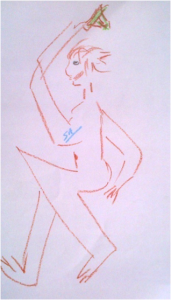
 “Tell me something,” the 15-year-old asked her mother, “what is it like the first time?”
“Tell me something,” the 15-year-old asked her mother, “what is it like the first time?”
“You, in your age and time,” replied the mother with a confident nod of her head, “will dance like an Amazon, swinging your undies wildly round and round over your head and whooping like a cowboy.”
That made the 15-year-old laugh.
She never forgot.
The first time was great.
She would have whooped, but she got caught up in the absolute rahrahrah of the moment.
Speaking of undies, have you heard of the bacon-scented ones? I read about them in the Pune Mirror recently and thought to myself, OMG, aargh, no, gag. But goodness, it is funny! You can read about it here – Bacon-Scented Underwear Now Exists – And Just In Time For Christmas. I know I shall return to this. It deserves more screen space!
So humour is a personal thing. Anything personal means it touches us deeply, for who we are. In what you find funny lies your truth.
This sort of humour can become generational, a part of oral storytelling and family history. Going back a few decades today, about seven I think, is this story: When the 15-year-old’s mother was perhaps herself just 5, living in a large joint family, she caught her sedate, dignified and at various stages of elderly, aunts, playing Pisa at a time of a family wedding. Three of them, in the middle of the night and by the light of an amused moon, had constructed of their sari-clad bodies, a tower, with the sturdiest aunt at the bottom. This one scolded the one in the middle for wriggling. The one right on top scolded the one in the middle for not being a few inches taller, as she stretched up on tiptoes to try and peep through the skylight. The whole edifice leaned dangerously to one side as the 5-year-old chanced upon them. “What are you doing?!” she squeaked, amazed. Pisa fell then. A tangle of mostly rotund squealing saris with aunts in and out of them, all three of whom scolded the child even as the door of the room they were spying upon opened. A pale face emerged trying to look fierce and not succeeding. This belonged to their youngest brother, he who had just gotten married and was attempting to create both privacy and intimacy for two newly-weds, of whom he was one! Most terribly embarrassed by the unruly sisters from newly-wed hell, they said he squawked out a few words in protest and then turned tail and double-locked the door. All of Pisa’s pieces jiggled and laughed hysterically before cuffing the bemused 5-year-old for giving them away and sending her off to her room. They laughed hysterically for decades when recounting this story. In this family, the first time has always been funny. Fun, not fear, ruled.
Seven decades later: “There’s a lot of sex in movies,” said a child to her mother, somewhat out of the blue. Not a very young child, but not a very grown up one either. That’s how they are when they’re all agog about that three-letter word. The mother looked at her child and said, “Ha, okay. Wow. So what are all these movies you’re watching?” She asked this in what she hoped was a reasonably casual tone bordering on funny, pretty much in keeping with the family tradition. “Marley and Me,” said the child.
“But isn’t that a film about a dog?” asked the mother, a bit confused.
“Yes,” said the child, “but you know that Marley’s owners, they keep having sex in the film!” “Ooo,” said the mother, “who would imagine that!” They didn’t put that in any of the reviews or descriptions of that film, she thought to herself wryly.
“It’s yucky!” the child pronounced. Her own assessment of the whole matter, reducing it to a single worm in a can.
Sex is everywhere and so is humour. So, in these generations of family history, many mothers and daughters, aunts and nieces, brothers and sisters, shaped an attitude to sex that had a mix of laugh, triumph and celebration. It kept sex and sexuality clean, happy and an accepted part of life’s goodies.

This book was pulled by the publisher and removed from bookstores after the furore it created. You can order it online from Amazon for just $3.35. For $12.56 you can buy a used copy of this book. The price goes up after it’s been read. Now I think that’s funny. Between $3.35 and $12.56 you have a convert who thinks the value of this book is higher than the market price.
On a blog called The Life and Times of an Indian Homemaker, I found this:
This kid won a fancy dress competition dressing up as a bruised husband with a placard around his neck that says, “I argued with my wife”. Now this child, like many others before him, is being raised on a different sort of humour with a different approach to gender and sexuality.
Why is this important? How does it matter what kind of humour we’re being raised with or by? The fact is, your funny shapes you. You shape your funny. It progresses from there. The funny around you shapes you too, and your funny shapes those around you.
In A Visit to the Rape Room: Who Sees Humor in Sexual Assault? Travis Langley writes,
“Some rape-related jokes trivialize sexual assault while others endorse it. Some people who crack such jokes neglect to consider the implications and impact upon victims and those around them; some others jest in order to cope with bad situations as a misplaced defense mechanism; and then there are those who sadistically celebrate these terrible things.”
In his piece, Why Offensive Jokes Affect You More Than You Realize, Scott Weems says, “…liking sexist humor has nothing to do with gender, at least ones views toward women are taken into consideration. Women are just as likely to enjoy sexist jokes as men, particularly when they hold sexist views themselves. This is interesting because it suggests that anyone can be sexist, and that liking sexist humor may say something unfortunate about our deeper beliefs.”
The Internet has a whole lot of psych-shrink stuff dealing with the negative impact of sexist humour upon human beings, sexuality and rights. It’s a tad more difficult to find work that deals with the positive impact of just a bit of the right kind of humour on sexuality and attitudes. Like this:
https://www.youtube.com/watch?v=6eZU1_9P31k
In this video, Mik Scarlet uses his own life experiences to talk of sex, humour and disability. He refers to the lack of motor ability in his genitals as “Mr Floppy stays floppy,” among other ways in which he infuses humour to make sex and disability easier to approach for the ignorant or the squeamish. “Some of the tricks we use,” says he, “would make non-disabled people’s sex lives much better!” Watching Mik’s presentation, you realise he’s using humour as seasoning to make some very important points and bust many myths. It isn’t stand-up comedy about sex and disability.
Here, as part of the ‘End the Awkward’ campaign, humour plays a big part of handling issues of disability and sexuality. Take a look:
Humour is also being explored as a classroom tool in the sexuality education toolkit. In Humor helps to convert ‘Haha’ into ‘Aha’!, the writer explores the many ways humour can be used in the sex ed classroom, but also points out how humour should not be used. Much that is written here can be stretched to cover an approach to humour and sexuality outside the classroom.
Humour needs a deeper look when we discuss sexuality. You don’t have to be a child to be raised in a certain way by jokes and attitudes of a certain kind. We are raised by jokes and attitudes around us all the time. We can change the things we find funny – and funny can change us.
I shall return to my contemplation of this:
No.
Like bacon ice-cream, it confuses me.
But no.
Should it be fried for breakfast?

